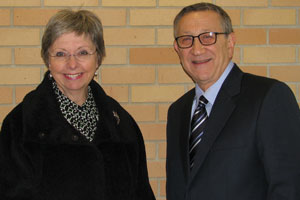
Dean Katharyn May and Richard Sinaiko
Thanks to named professorships, the University of Wisconsin-Madison School of Nursing is recruiting new faculty to bolster clinical teaching, encourage cooperation among health-care providers and delve deeper into how nurses can best serve families and children.
With new faculty and a spring start for a new nursing building, the School anticipates growing by 30 percent in the next five years.
“This will be a groundbreaking year for the School of Nursing, as construction begins on our new home and as we begin to recruit new tenure-track and clinical faculty who will help to write the next chapter of the story of nursing at Wisconsin,” Dean Katharyn May said. “We are so grateful to have the support of generous friends who are making that future possible.”
The Mary and David Anderson/American Family Clinical Faculty Support Fund supplements salaries for clinical faculty members.
The Andersons have a rich history with the UW-Madison. Mary Anderson, who is retired from the Madison School District, is a 1970 nursing graduate; David Anderson, chairman and chief executive officer of American Family Insurance, earned his undergraduate degree in finance in 1970 and an MBA in 1974. Their daughter is also a School of Nursing alumna. With a matching gift from American Family Insurance, the Andersons gave $100,000 to the new nursing building and $400,000 to support faculty.
“With the way health care is going, nurses are going to have to play a bigger role,” Mary Anderson said. Nurses will need more education, and nursing will need more faculty.
The couple supports clinical faculty because they believe those nurses will inspire students by their passion and their knowledge. They can model best practices for students, Mary Anderson said. Those students will share their experience, which may inspire more students to choose nursing.
“We’re getting older,” she added. “I want a well-educated nurse to take care of me.”
The Andersons also supported the building because it supports better teaching.
“The Andersons have made a very special gift – one that allows us to focus on recruiting and retaining the very best clinical faculty,” May said. “While clinical teaching is at the heart of our mission, and our school has long been known for excellence, this gift will allow the School to do more to reward excellence in a very tangible way.”
The Richard Sinaiko Professorship in Health Care Leadership was designed to encourage a new, cooperative health-care model.
Evidence increasingly shows that nurses, physicians and pharmacists will need to collaborate closely to deliver affordable, top-quality health care, said Richard Sinaiko (’66 BS L&S), retired CEO of Sinaiko Healthcare Consulting in Los Angeles. “We need to educate clinical caregivers to communicate better and work more effectively with each other,” he said.
The School is looking for a nurse scientist, or a scientist with a health-related background, who has a strong research program in areas such as health systems or health services, nursing outcomes, health-care leadership or patient safety and quality.
Sinaiko hopes the position will be filled by someone with experience in nursing management and leadership who will promote a team approach to health care that’s safe, effective and efficient, and translate those objectives into day-to-day policies and procedures. “The provider community is looking for this kind of leadership,” May said. ”They’re excited about our plans for this kind of interdisciplinary education.”
Evidence shows the historical medical model needs to be adapted to the new economy and the capabilities of information technology, Sinaiko said. The need for closer collaboration among care providers is enhanced by the federal government’s clear message that providers are responsible for the quality of care and the time it takes to deliver that care.
The School is also recruiting to fill the Florence Blake Professorship to bring an additional scholar in child and family nursing to the School. Blake, who retired in 1970, joined the UW-Madison faculty in 963 and began the first masters of science program in pediatric nursing. In her classic 1954 text ”The Child, His Parents and the Nurse,”she embraced the psychosocial paradigm of her era – separation and attachment – and interpreted it for situations in which nurses might be involved with parents and children during childhood illness. Blake explored in depth children’s experiences of hospitalization and surgery, and she educated a generation of nurses and physicians who led advancements in the care of children and families.
The Madison Initiate for Undergraduates also has designated $500,000 to the School to expand its faculty and staff as it expands its undergraduate program.
